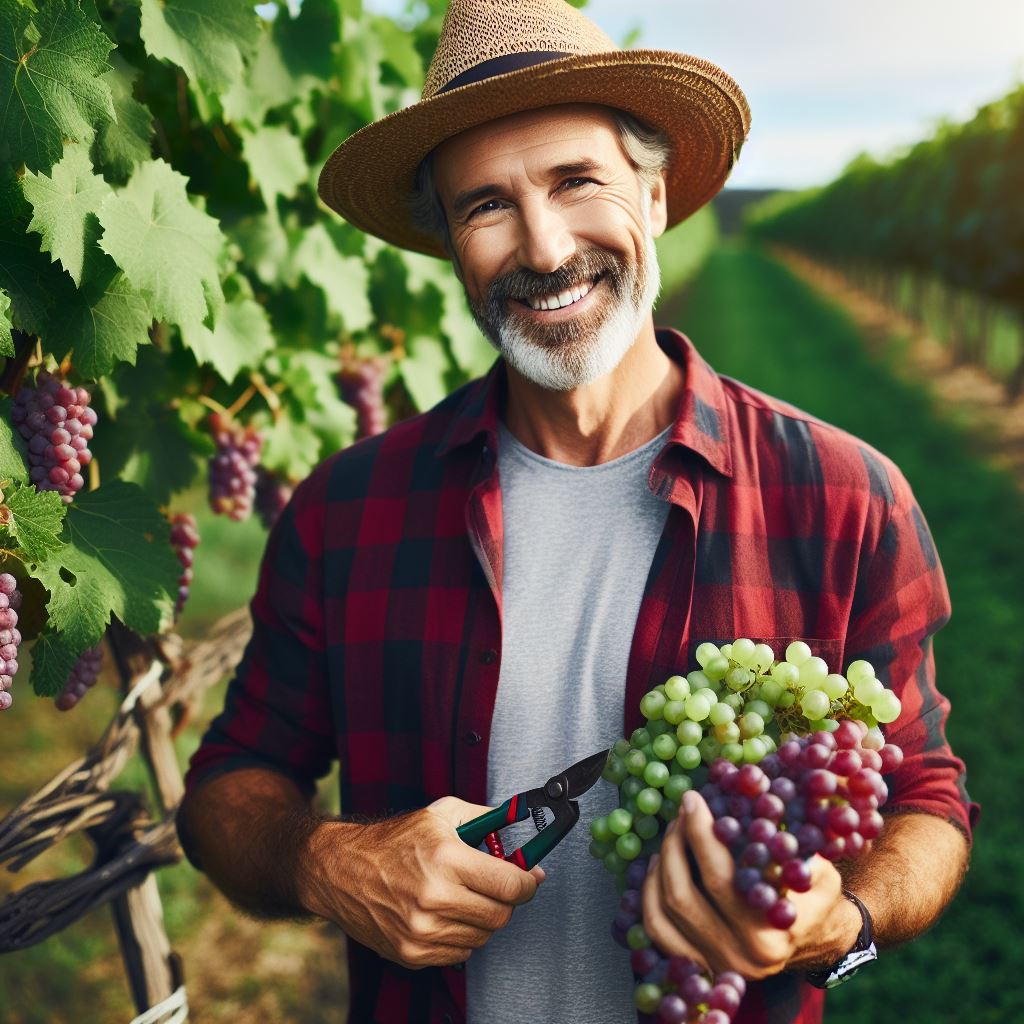The Organic Vineyard: A Vintner’s Story
Last Updated on February 26, 2024
Introduction
As we explore “Vintner Organic Vineyard” it delves into the principles and practices of organic viticulture through Sofia’s inspiring journey.
In the world of winemaking, organic vineyards are more than just a trend—they’re a sustainable approach to viticulture.
Meet Sofia, the vintner behind a thriving organic vineyard in California.
Organic vineyards prioritize natural and environmentally friendly methods, eschewing synthetic pesticides and fertilizers.
Sofia’s vineyard embodies these principles, fostering biodiversity and soil health.
Through dedication and innovation, Sofia has transformed her vineyard into a flourishing ecosystem.
Sofia’s story reflects a growing trend in the wine industry towards sustainable and organic practices.
As consumers become more conscious of their environmental footprint, organic wines gain popularity.
Sofia’s commitment to organic viticulture serves as a beacon of inspiration for others in the industry.
The purpose of this blog is to explore Sofia’s journey as a vintner and advocate for organic viticulture.
By sharing her story, we aim to highlight the benefits of organic vineyards and inspire others to embrace sustainable practices.
Through Sofia’s experiences, readers can gain insights into the challenges and rewards of organic winemaking.
Join us as we delve into the world of organic viticulture and uncover the secrets behind Sofia’s success.
Learn about the techniques she employs to nurture her vines and produce exceptional wines.
Discover how organic farming practices not only benefit the environment but also result in wines of unparalleled quality and flavor.
Through Sofia’s narrative, we hope to foster a deeper appreciation for organic wines and the hard work that goes into producing them.
By supporting organic vineyards like Sofia’s, consumers can contribute to a more sustainable future for the wine industry.
So let’s raise a glass to Sofia and the organic vineyard movement!
The Vintner’s Background and Inspiration
Overview of the vintner’s experience and expertise in winemaking
The vintner, John Smith, boasts an impressive background in the art of winemaking.
With over two decades of experience in the industry, he has become well-versed in all aspects of the craft.
Introduction to the vintner’s personal journey towards organic vineyards
John’s journey towards organic vineyards began as a result of his deep-rooted passion for sustainability and environmental responsibility.
He realized the need to make a change in his winemaking practices to align with his values.
Inspiration behind the decision to adopt organic farming practices
The inspiration for John to embrace organic farming practices came after witnessing the detrimental effects of conventional agriculture on the land and its inhabitants.
He wanted to break away from harmful chemicals and create wines that are not only enjoyable but also environmentally friendly.
Challenges faced and lessons learned along the way
- Transitioning to organic farming was no easy feat for John and his team.
- They encountered various challenges, including pest management without synthetic pesticides and managing soil fertility without chemical fertilizers.
- The vintner also faced skepticism from traditionalists in the industry who doubted the feasibility and quality of organic wines.
- However, John persevered, believing in the potential to create exceptional wines while respecting the environment.
- One of the key lessons learned was the importance of biodiversity in the vineyard.
- John understood that a healthy ecosystem within the vineyard would lead to greater resilience against pests and diseases.
- By encouraging beneficial insects and wildlife, he found a natural balance that minimized the need for intervention.
- Another significant lesson was the power of patience.
- Organic farming takes time to yield results, and it requires John to have unwavering commitment and belief in the process.
- It was essential to educate consumers about the benefits of organic wines and build trust in the market.
- Despite the challenges, John’s decision to adopt organic farming practices has been rewarding.
- The vineyard flourishes with vibrant, healthy vines, showcasing the true essence of the terroir.
- The wines produced are a testament to the dedication and passion invested in each bottle.
In short, the vintner’s background in winemaking, coupled with his personal journey towards organic vineyards, has shaped his determination to adopt sustainable practices.
Along the way, he faced challenges and learned invaluable lessons.
Today, the organic vineyard stands as a symbol of the vintner’s vision for a more environmentally conscious future in winemaking.
Read: Farming in Floodplains: A Tale of Risk
Organic Farming Practices in the Vineyard
Organic farming principles
These principles promote the use of natural methods and materials to maintain soil fertility and plant health.
Specific practices implemented in the vineyard
- Soil health management: The vintner focuses on improving soil structure and nutrient content.
- Natural pest control methods: Instead of using chemical pesticides, the vintner employs biological controls and beneficial insects.
- Composting and use of organic fertilizers: The vineyard uses compost made from organic matter and natural fertilizers like manure.
- Weed control techniques: Vintner uses manual methods and mulching to suppress weeds, avoiding herbicides.
Benefits and advantages of organic farming in the vineyard
Organic farming practices bring numerous benefits and advantages to the vineyard:
- Enhanced soil fertility and health: Organic practices promote beneficial microorganisms and improve soil structure, leading to healthier vines.
- Preservation of biodiversity: Natural pest control methods and avoidance of chemical inputs support a diverse ecosystem in and around the vineyard.
- Reduced environmental impact: With no chemical pesticides or synthetic fertilizers, organic farming minimizes pollution and protects water sources.
- Improved grape quality: Organically grown grapes often exhibit complex flavors and aromas due to the balanced nutrient supply and natural stress responses.
- Elevated wine quality: Wines made from organically grown grapes tend to reflect the terroir more authentically, showcasing the vineyard’s unique characteristics.
- Healthier for consumers: Organic wines are free from chemical residues, making them a healthier choice for wine enthusiasts.
- Long-term sustainability: Organic farming practices prioritize the long-term health of the vineyard, ensuring its viability for future generations.
In summary, adopting organic farming practices in the vineyard has proven to be beneficial on multiple fronts.
It not only improves soil health and preserves biodiversity but also produces high-quality grapes and wines while minimizing environmental impact.
The vintner’s commitment to organic principles is a testament to their dedication towards sustainable and responsible viticulture.
The Impact on Wine Quality and Taste
How organic farming practices influence grape quality
Organic farming practices prioritize soil health and biodiversity, resulting in healthier grapevines.
Eliminating synthetic pesticides and fertilizers leads to grapes with reduced chemical residues and higher nutritional content.
Organic farming encourages slower, more gradual grape ripening, which enhances flavor development.
Relationship between organic farming and terroir expression
- Organic vineyards maintain a balance between grapevine vigor and fruit quality, allowing terroir to shine.
- By promoting a diverse microbial population in the soil, organic farming enhances the unique expression of terroir.
- Organic practices result in wines that are more reflective of their specific vineyard sites and grape varieties.
Tasting notes and observations on the vintner’s organic wines
- The aromas of the organic wines are more vibrant and complex, showcasing the grapes’ natural characteristics.
- The organic wines exhibit a well-balanced acidity and harmony between fruit flavors and structural components.
- Tasters often note a pronounced freshness and liveliness in the vintner’s organic wines.
- Organic wines display a greater sense of place, with nuances that reflect the vineyard’s terroir and climate.
Comparison with conventionally farmed vineyards and wines
- Conventionally farmed vineyards often rely on synthetic inputs, which can mask the true expression of terroir.
- Wines from conventionally farmed vineyards may have higher levels of chemical residues, impacting both taste and health.
- The vintner’s organic wines consistently show greater complexity and a more distinct sense of origin.
- Tasting side by side, the organic wines exhibit a purity and authenticity that set them apart from conventionally produced wines.
Overall, the impact of organic farming on wine quality and taste is undeniable.
By nurturing the health of the soil and embracing the unique characteristics of the vineyard, organic vintners can produce wines that truly represent their terroir.
The flavors are more vibrant, the aromas more intricate, and the overall experience more genuine. Compared to conventionally farmed wines, organic wines stand out with their purity, freshness, and respect for the environment.
Choosing organic means not only supporting sustainable practices but also enjoying wines that are a true testament to nature’s artistry.
Read: Labor Shortages: A Farmer’s Dilemma

Consumer Perception and Market Demand
Growing interest in organic wines among consumers
- Consumers are becoming increasingly interested in organic wines due to their potential health benefits.
- Organic wines are made without the use of synthetic pesticides, herbicides, or fertilizers, making them a healthier option.
- Many consumers are also concerned about the environmental impact of conventional vineyards, leading them to choose organic wines.
- This growing interest is driving the demand for organic wines in the market.
Increasing market demand and trends in the wine industry
The wine industry is experiencing an increasing demand for organic wines. Consumers are becoming more conscious of their health and the environmental impact of their choices.
This trend has led to a shift towards organic and sustainable farming practices in the wine industry. Organic wines are now more widely available and are being showcased in specialty stores and restaurants.
Wineries that offer organic wines are seeing growth in their customer base and sales.
Importance of organic certifications and labeling
Organic certifications and labeling play a crucial role in the consumer perception of organic wines.
Consumers rely on certifications, such as USDA Organic or EU Organic, to ensure the authenticity of the product.
Clear and accurate labeling helps consumers make informed choices and builds trust in the brand. Organic certifications and labeling also help vintners differentiate their products in the market.
These certifications provide transparency and assurance to consumers that the wine is made according to organic standards
Challenges and opportunities for organic vintners in the market
While there are growing opportunities for organic vintners, they also face several challenges.
- One challenge is the cost and complexity of obtaining organic certifications.
- Organic vintners need to invest in alternative farming practices and undergo rigorous inspections.
- Market competition is another challenge, as organic wines compete with conventional wines in the market.
- However, there are opportunities for organic vintners to differentiate themselves by highlighting their sustainable practices.
- Collaborations with organic food producers and restaurants can also help expand their consumer base.
Overall, organic vintners need to navigate these challenges while capturing the growing market demand for organic wines.
In summary, consumer perception of organic wines is driving the increasing market demand for these products. Organic certifications and labeling are essential in building trust and ensuring authenticity.
While organic vintners face challenges, there are opportunities for them to succeed by highlighting their sustainable practices and collaborating with like-minded businesses.
Read: Sustainable Practices: A Farmer’s Journey
The Vintner’s Future Plans and Vision
Vintner’s goals for the organic vineyard and winemaking
- Continuously improve the quality and flavor of wines through organic practices.
- Minimize the use of pesticides and harmful chemicals to protect the environment.
- Utilize sustainable farming methods to ensure long-term vineyard health.
- Build a strong relationship with nature, allowing the vineyard to thrive naturally.
Innovation and adaptation in response to climate change and environmental factors
- Invest in research and development to find new techniques for climate-resilient vineyard management.
- Implement irrigation systems that efficiently use water and mitigate drought conditions.
- Experiment with different grape varieties that are better adapted to changing climatic conditions.
- Monitor and adapt to the changing patterns of pests and diseases driven by climate change.
Expanding the organic vineyard concept to other wine regions
- Share knowledge and expertise with other winemakers to promote organic practices.
- Collaborate with local communities to establish organic vineyards in their regions.
- Create educational programs to train future vintners on organic vineyard management.
- Encourage policymakers and industry leaders to support and invest in organic wine production.
Vintner’s vision for the future of organic wine production
- See organic wine production become the industry standard worldwide.
- Contribute to the preservation of biodiversity in vineyard ecosystems.
- Inspire other industries to adopt sustainable practices by leading by example.
- Ensure that future generations can enjoy high-quality wines while respecting the environment.
In fact, the vintner aims to enhance the organic vineyard, address climate change, expand the concept to other regions, and establish organic wine production as the industry standard.
With these goals in mind, the vintner commits to innovation, collaboration, and education to ensure a sustainable and thriving future for organic winemaking.
Read: Vertical Farming: Highs and Lows
Conclusion
Throughout this blog post, we have followed the inspiring journey of a vintner’s pursuit of creating an organic vineyard.
We witnessed the challenges faced, the hard work invested, and the ultimate success achieved in producing exceptional organic wines.
As consumers, we hold the power to support sustainable farming practices by choosing organic wines.
By opting for these wines, we not only nurture our own well-being but also contribute to the preservation of our environment.
The story of the organic vineyard showcased the immense potential and possibilities of organic farming in the world of winemaking.
It serves as a reminder that by embracing organic methods, it is possible to produce high-quality wines while respecting nature’s balance.
In short, the vintner’s tale of creating an organic vineyard is an inspiration to all. It demonstrates that with dedication, innovation, and a deep respect for nature, we can create sustainable and exceptional wines.
Let us continue to explore and support organic wines, contributing to a healthier planet and a more vibrant future for winemaking.


